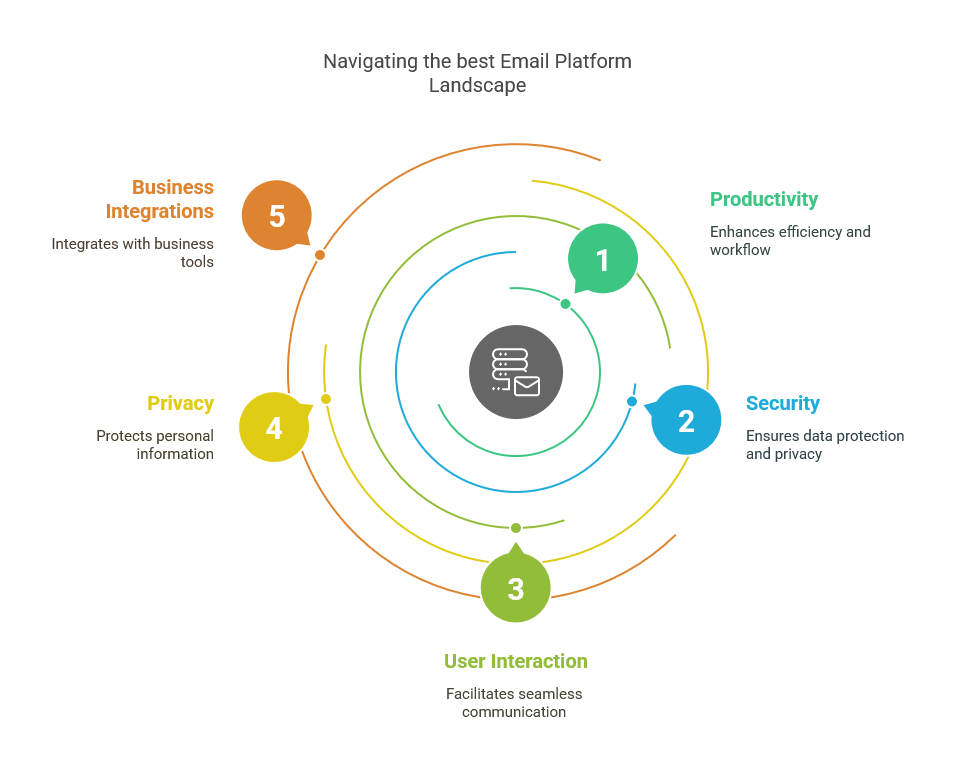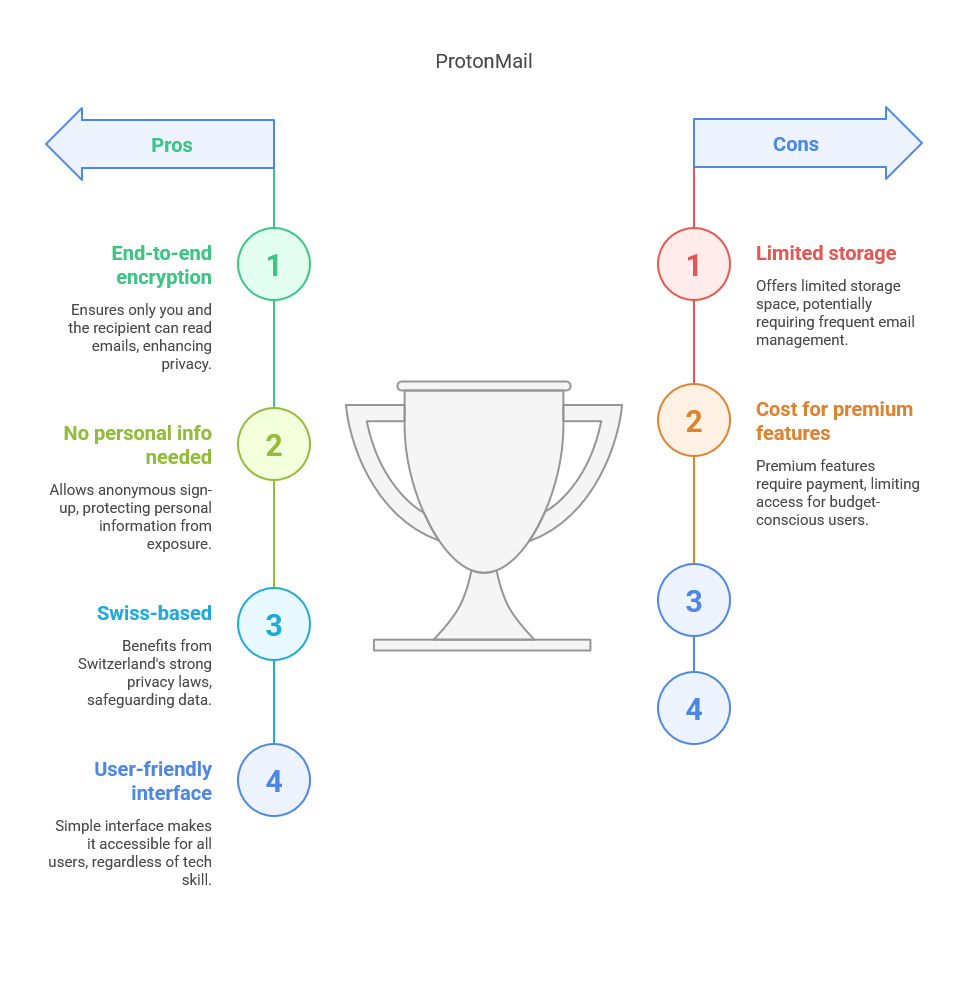The best email platforms have become a vital part of modern communication, whether for personal or business use. Choosing the right email platform can significantly affect your productivity, security, and the way you interact with others. With numerous platforms available today, it can be overwhelming to choose the one that best suits your needs.
In this comprehensive guide, we’ll explore some of the best email platforms in 2025. From secure services designed for privacy to business-oriented platforms with powerful integrations, you’ll find a solution that matches your needs.

Why Does Choosing the Right Email Platform Matter?
The right email platform isn’t just about sending and receiving messages; it’s also about managing and organizing them effectively. It’s about getting things done efficiently and securely. Whether you’re managing a team, running a business, or handling personal communication, the email platform you choose should help you:
-
Stay organized with tools for managing messages, calendars, and tasks.
-
Ensure security with encryption and strong privacy measures.
-
Enhance productivity by seamlessly integrating with other tools you use daily.
Selecting a platform that aligns with your needs can enhance your efficiency and ensure a seamless user experience.
1. Gmail: The Most Popular Email Service
Gmail has become the go-to email platform for millions of users. It’s simple, intuitive, and integrates well with Google’s suite of apps. Whether you’re using it for personal or professional purposes, Gmail offers several features that make it the top choice for many.
Why Choose Gmail?
-
Free for personal use: Gmail is completely free for personal users with up to 15 GB of storage.
-
Robust security features: Gmail offers excellent security, featuring two-factor authentication (2FA) and Google’s built-in spam filters.
-
Excellent integration: It works seamlessly with other Google services such as Google Calendar, Google Drive, and Google Docs, allowing for smooth transitions between tasks.
-
Large storage capacity: With 15 GB of free storage, you can store plenty of emails, attachments, and other data.
Is Gmail Secure Enough for Business?
For most personal and small business uses, Gmail provides more than adequate security. Google uses SSL encryption to protect your email data, and you can add additional layers of protection with advanced Google security features.
2. Outlook: A Business-First Email Platform
Outlook, Microsoft’s email service, is one of the best email platforms, particularly for business use. It provides a comprehensive suite of tools that caters to professionals and companies who need advanced organizational features.
Why Choose Outlook?
-
Excellent for business users: Outlook is tightly integrated with Microsoft’s Office 365 suite, offering tools such as Word, Excel, and Teams, making it an ideal choice for businesses.
-
Powerful scheduling tools: Outlook provides robust calendar features that enable users to schedule meetings, appointments, and tasks with ease.
-
Advanced organizational features: It includes a powerful filtering system to help you manage your inbox and stay on top of important emails.
-
Strong security: Outlook supports encryption and offers excellent spam protection, making it a secure choice for handling business communications.
Who Should Use Outlook?
Outlook is best suited for businesses or individuals already using Microsoft tools. Its powerful integration with the Office 365 suite and Teams makes it a popular choice for companies, while its robust features also cater to those who need advanced organization tools.
3. ProtonMail: For Maximum Security and Privacy
In today’s digital age, privacy and security are essential. ProtonMail is an email platform that focuses entirely on providing a private and secure email experience. If keeping your communications safe from hackers, corporations, and government surveillance is a priority, ProtonMail is the best email platform for you.
Why Choose ProtonMail?
-
End-to-end encryption: ProtonMail’s primary feature is its end-to-end encryption, which means that only you and the recipient can read the emails.
-
No personal information required: Unlike other services, ProtonMail allows you to sign up without needing to provide personal information. This ensures that your account remains anonymous.
-
Swiss-based: ProtonMail is based in Switzerland, which has some of the world’s most stringent privacy laws, ensuring that your data is safe from government surveillance.
-
User-friendly interface: Despite its high level of security, ProtonMail features a simple and easy-to-use interface, making it accessible to both new and experienced users.

Is ProtonMail Only for Businesses?
While ProtonMail is a great choice for businesses concerned with privacy, it is especially popular with individuals who are passionate about keeping their communications secure.
4. Zoho Mail: A Great Option for Small Businesses
Zoho Mail is one of the best email platforms for small businesses. It offers both free and paid plans that provide powerful email features and an ad-free experience, even on the free tier. Zoho Mail is part of Zoho’s suite of business applications, making it an ideal choice for companies that need an affordable yet feature-rich email platform.
Why Choose Zoho Mail?
-
Free for small teams: Zoho Mail’s free plan allows up to 5 users, making it an excellent choice for startups and small businesses.
-
Ad-free experience: Unlike many free email services, Zoho Mail offers an ad-free inbox, resulting in a cleaner and more professional email experience.
-
Integration with Zoho apps: Zoho Mail integrates seamlessly with Zoho’s suite of productivity apps, including CRM, project management tools, and file storage.
-
Strong security: Zoho Mail offers strong security features, including two-factor authentication, encryption, and spam filtering.
Who Should Use Zoho Mail?
Small business owners who need a simple yet reliable email platform will benefit the most from Zoho Mail. Its integration with Zoho’s business apps makes it an excellent all-in-one solution for small companies.
5. Apple Mail: A Simple and Effective Email Platform
Apple Mail is the default email app for macOS and iOS devices. It is a simple, clean, and effective email platform that integrates well within the Apple ecosystem. While not as feature-packed as other platforms, Apple Mail is a strong contender for those who prefer a straightforward, no-fuss experience.
Why Choose Apple Mail?
-
Easy to use: Apple Mail features a user-friendly interface that is intuitive and straightforward, making it accessible to anyone.
-
Integration with Apple services: It integrates seamlessly with other Apple services, such as iCloud, Calendar, and Contacts, creating a smooth workflow across devices.
-
Free for all Apple users: Apple Mail is available free of charge to all users who own an Apple device, making it a convenient choice for those invested in the Apple ecosystem.
-
Privacy-focused: Apple prioritizes privacy, and Apple Mail reflects this commitment, offering robust encryption and comprehensive privacy settings.
Who Should Use Apple Mail?
Apple Mail is best for those who are already invested in the Apple ecosystem. It’s a great choice for individuals who prefer a simple, clean email experience without the need for advanced features.
6. Yahoo Mail: A Trusted Name with Great Features
Yahoo Mail remains a popular email platform, offering ample storage, excellent organization tools, and strong spam protection. It’s particularly great for users who want a straightforward email experience without unnecessary complexity.
Why Choose Yahoo Mail?
-
Large storage capacity: Yahoo Mail offers users 1 TB of storage, making it ideal for those who need to store a large volume of emails and attachments.
-
Organizational tools: Yahoo Mail offers robust organizational tools, including folders, tags, and filters, to help you maintain a well-organized inbox.
-
Great spam filters: Yahoo’s spam filters are among the best in the industry, helping you keep unwanted emails at bay.
-
Free and easy to set up: Yahoo Mail is free to use and is quick to set up, making it a great choice for beginners.
Who Should Use Yahoo Mail?
Yahoo Mail is ideal for users who need ample storage and great organizational tools without the complexity of business-level email platforms.
Comparing Features: Which Email Platform is Right for You?
| Feature | Gmail | Outlook | ProtonMail | Zoho Mail | Apple Mail | Yahoo Mail |
|---|---|---|---|---|---|---|
| Free Version | Yes | Yes | Yes | Yes | Yes | Yes |
| Strong Security | Moderate | High | Very High | High | Moderate | Moderate |
| Storage Capacity | 15 GB | 15 GB | Limited | 5 GB (free) | 5 GB (free) | 1 TB |
| Business Integration | Excellent | Excellent | Good | Excellent | Moderate | Moderate |
| Mobile Access | Yes | Yes | Yes | Yes | Yes | Yes |
This comparison table will help you quickly assess which email platform suits your needs.
FAQ: Your Email Platform Questions Answered
-
What is the best email platform for businesses?
Outlook and Zoho Mail are excellent options for businesses due to their powerful integration with various business tools.
-
Is Gmail secure enough for business use?
Gmail is secure, but ProtonMail offers higher privacy and security features, especially for confidential communications.
-
Can I use multiple email platforms?
Yes, many people use multiple email platforms for different purposes, such as one for work and another for personal use.
-
What’s the best email platform for privacy?
ProtonMail is the best for privacy, with end-to-end encryption and anonymous sign-up.
-
Can I use email platforms on my phone?
Yes, all the email platforms discussed in this article have apps for both Android and iOS.
Choosing the best email platform depends on your specific needs and requirements. If you’re looking for a well-rounded, easy-to-use service, Gmail is the best option. For businesses, Outlook and Zoho Mail are ideal. For security-conscious individuals, ProtonMail is the most reliable. Finally, if you prefer simplicity and use Apple products, Apple Mail is an excellent choice. With these options, you can find the best platform for your personal or business communication needs.

